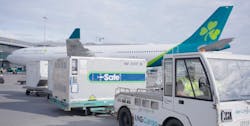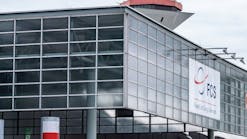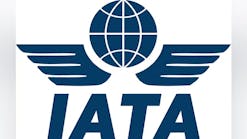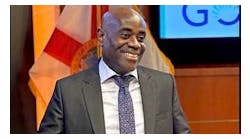WEST STAR AVIATION
Grand Junction FBO grows its maintenance capability to meet the inevitable needs of aircraft operators
By John Boyce, Contributing Editor
February 2000
Mike McClain, right; and Louis Buescher
GRAND JUNCTION, CO — West Star Aviation at this city's Walker Field takes the approach to aviation business similar to the grocery store industry's approach to food. The grocery stores say that no matter what else happens, people have to eat. West Star says no matter what else happens, if people own and fly airplanes they have to do maintenance.
"Our core business," says West Star president Mike McClain, "is maintenance and that's what we want it to be because if times adjust, if the money is not as good as it is right now, the gravitation is always back to what you have to do and fliers have to do maintenance. They don't have to do avionics; they don't have to do paint; they don't have to do interiors. But if they fly they'll buy fuel and do maintenance."
However, if those fliers want avionics, paint, or interior work, West Star is capable of accommodating them. It is currently building a state-of-the-art, 25,000-sq. ft., three-Challenger-size bay paint hangar to replace the two-bay hangar in place now. The company recently expanded its avionics facilities, is going to build a new storage hangar, and is contemplating a new maintenance hangar. Fuel sales, which include military and commercial contracts, amount to approximately three million gallons a year. West Star has salesmen dedicated to paint, avionics, maintenance, interiors, and fuel and is looking to increase the sales staff.
"We have a philosophy that we want to have an FBO with one-stop shopping," says Louis A. Buescher, corporate vice president of West Star's parent, Buescher Family Limited Partnership (BFLP), "so the guy coming in for maintenance or avionics could also get paint and upholstery. We're built around getting that customer in here and he could get everything done in one place in less time."
West Star is a business in a state of rapid transition. It's in the process of moving from an operation that specialized in piston-engine maintenance and Cessna Conquest Dash-10 conversions to one that is broadening into strictly jet and turbine-engine maintenance with an emphasis on Lears, Citations, and Hawkers. The company recently sold its piston-engine maintenance division. The Dash-10 program — in which the original Conquest Dash-8 engine is converted to the more versatile Dash-10 — has been hugely successful. However, it's a declining business because the company has converted 75 percent of the original 360 Conquests built.
In girding itself for the inevitable day the Dash-10 program either evaporates or becomes an insignificant trickle, West Star gauges how it is doing by how much revenue it takes in above and beyond Dash-10 work.
"We've done about $30 million in each of the past two years," McClain explains, "and we are on that kind of swing again for this year. But the mix has changed. It used to be all Conquests and now it's all jet maintenance. Last year we did 29 conversions —- the most we've ever done in one year. That's a lot of dollars but a small profit percentage. This year we've done the least (conversions) we've ever done but we've done the same amount of business. That's how the mix is changing."
But while the Conquest Dash-10 program inevitably declines, West Star recently purchased Intercontinental Jet Corp. (IJC) of Tulsa, one of the nation's largest Mitsubishi MU-2 maintenance facilities which was recently awarded an STC for a Dash 10 conversion of the MU-2's Dash 5 and 6 engines. There are 460 MU-2 operators worldwide.
"It's a very logical addition to our company," Buescher says. "IJC does for the MU-2 market what we have been doing for the Conquest, Learjet, Hawker, and Citation markets for years — maintaining a high quality workforce with specialized knowledge and experience with the aircraft."
LOOKING BEYOND DASH-10
The Buescher family (BFLP) came into possession of the FBO, which had
been operating as Monarch Aviation since 1952, in early 1987 as the result
of a bankruptcy sale. But it wasn't until 1996 that BFLP saw the necessity
to grow beyond the Dash-10 program. As a result they hired Larry Graham
from Duncan Aviation in Lincoln, NE, and he was the one who set an aggressive
course into Lears, Citations, and Hawkers that eventually grew the workforce
from 40 people in 1987 to the 250 currently employed at the FBO.
"We knew," Buescher says, "that the product line (Dash-10) three years out was going to die out and we knew that we had to get into other product lines. It became Larry's dream to take us in that direction. He was enthusiastic; he worked long hours developing the business and recruiting the people we needed. He built the program."
Some nine months after hiring on in early 1996, Graham hired McClain, whom he had worked with at Duncan in the 1980s, as vice president for marketing and sales. He then set about recruiting skilled personnel he would need for his ambitious program.
As McClain explains it, Graham saw that Duncan was de-emphasizing Lear and Citation work in favor of bigger aircraft. So, he gave many Duncan technicians the opportunity to work in a company that was growing through Lears and Citations.
"They flocked here, is what they did," McClain says. "We moved about 40 families here from Duncan. It was a huge expense. We put on about five product lines in one year (1997), moved all those families, bought all that tooling, all those books."
The expansion paid immediate dividends, McClain says. "The next year was a complete, 100 percent turnaround. We had almost a million dollar profit year, which had never happened."
Unfortunately, Graham died in early 1998, after which McClain assumed the leadership. Under McClain's stewardship, the company is still looking far into the future.
"Oh yes," Buescher says, "Mike has definitely expanded Larry's vision. We're looking at re-engining various aircraft— turbine and jet— and looking to get into larger airframes in the future. We're looking at a new maintenance hangar, we need to expand our cabinet and upholstery shops."
A company that once specialized in Conquest maintenance and piston-engine overhauls, West Star is redefining its business in other maintenance lines.
CIRCUMSPECT EXPANSION
West Star is aggressive in its ambition but it is circumspect in its approach
to growth. "We want to grow into various areas," McClain says,
"but we don't want to outkick our coverage. We don't want to take
on more than we're capable of handling." McClain has been approached
by several people wanting the company to get into different areas of paint
and maintenance, he says, and he is looking seriously at some of those
but he wants to grow into them. He wants to be able to afford the tooling
necessary and the hangar space without taking on big debt; And, he wants
to keep the number of personnel to below 400 (it is currently at 250).
"We want to see that we're overfull for a length of time before we say we want to build a another hangar," McClain says, "because we don't want to build it and have it empty.... And I don't want us to need 800 people, I'd like to keep it under 400 to maintain that family feel. Over that and you're growing a bureaucracy."
Space is not a problem for expansion; adjacent to company offices is a six-acre parcel of land that West Star has a lease option on. However, getting and retaining skilled technicians could be the biggest barrier to expansion.
"The competition for trained mechanics is fierce right now," McClain says. "Finding qualified manpower is an inherent problem in this business. And what you have to pay them.... We've increased our labor rate an average of $2 an hour for the whole company over the past year and a half. You can't grow good people overnight so you have to keep them happy."






